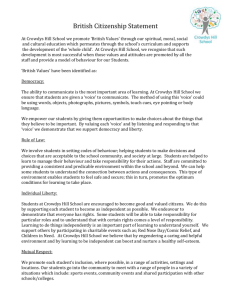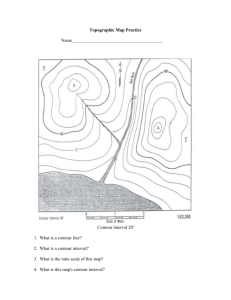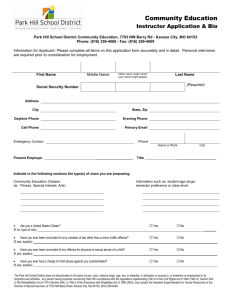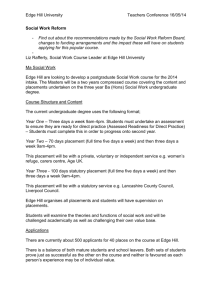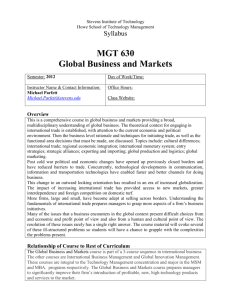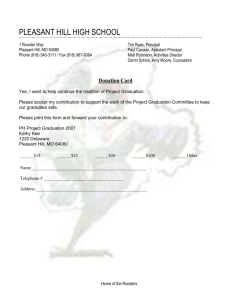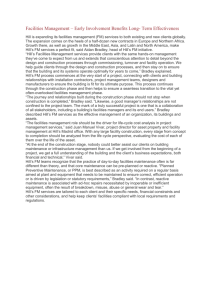Preliminary Syllabus
advertisement
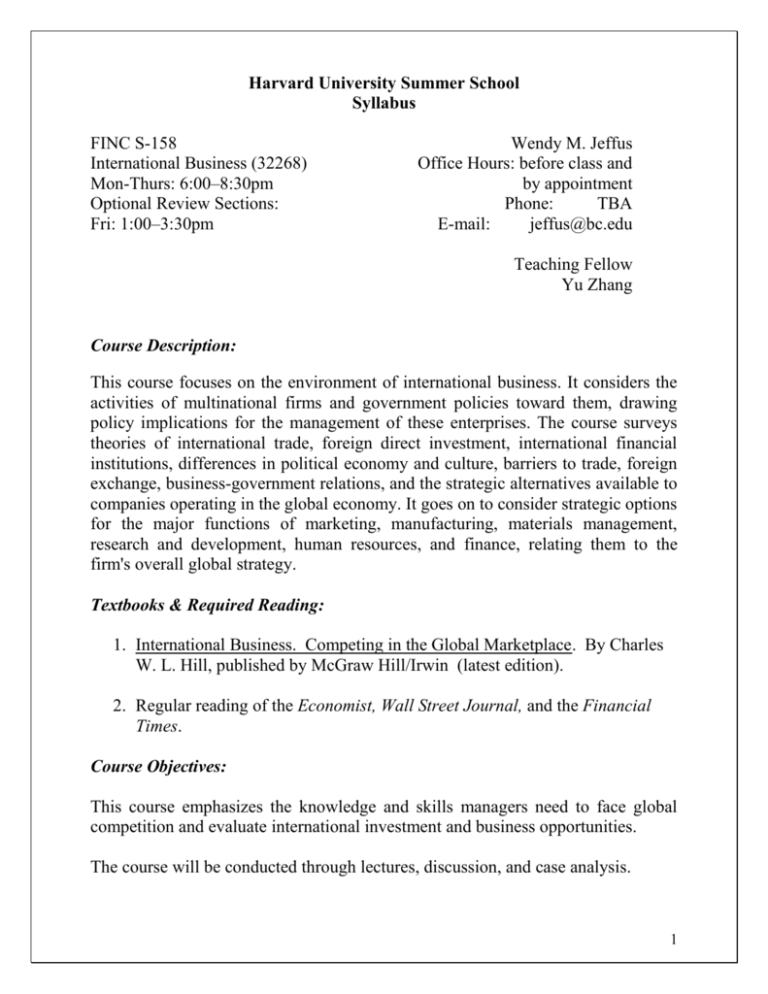
Harvard University Summer School Syllabus FINC S-158 International Business (32268) Mon-Thurs: 6:00–8:30pm Optional Review Sections: Fri: 1:00–3:30pm Wendy M. Jeffus Office Hours: before class and by appointment Phone: TBA E-mail: jeffus@bc.edu Teaching Fellow Yu Zhang Course Description: This course focuses on the environment of international business. It considers the activities of multinational firms and government policies toward them, drawing policy implications for the management of these enterprises. The course surveys theories of international trade, foreign direct investment, international financial institutions, differences in political economy and culture, barriers to trade, foreign exchange, business-government relations, and the strategic alternatives available to companies operating in the global economy. It goes on to consider strategic options for the major functions of marketing, manufacturing, materials management, research and development, human resources, and finance, relating them to the firm's overall global strategy. Textbooks & Required Reading: 1. International Business. Competing in the Global Marketplace. By Charles W. L. Hill, published by McGraw Hill/Irwin (latest edition). 2. Regular reading of the Economist, Wall Street Journal, and the Financial Times. Course Objectives: This course emphasizes the knowledge and skills managers need to face global competition and evaluate international investment and business opportunities. The course will be conducted through lectures, discussion, and case analysis. 1 Session 1 2 3 4 5 6 7 8 9 10 11 12 13 14 15 16 Date Topics, Readings, & Assignments 6/23 Introduction to Globalization and Course Expectations HILL: Chapter 1 6/24 National Differences in Political Economy & Differences in Culture HILL: Chapters 2 & 3 Comments on Team-Building Report Proposals: (1 Slide 2 minutes) 6/25 Ethics in International Business, International Trade Theory & The Political Economy of International Trade HILL: Chapters 4 - 6 Case Study: Nike: The Sweatshop Debate 6/26 Foreign Direct Investment HILL: Chapter 7 Case Study: Starbucks’ Foreign Direct Investment Case Study: Cemex’s Foreign Direct Investment 6/30 Regional Economic Integration & Foreign Exchange Market HILL: Chapters 8 & 9 Case Study: Boeing vs. Airbus: Two Decades of Trade Disputes 7/1 The International Monetary System & The Global Capital Market HILL: Chapters 10 & 11 Review for Midterm (Project Topics Due) 7/2 Mid-term Exam 7/3 The Strategy & Organization of International Business HILL: Chapters 12 & 13 Case Study: MTV Networks Case Study: Nestlé 7/7 The Great Globalization Debate Group Presentations 7/8 Entry Strategy and Strategic Alliances & Exporting HILL: Chapters 14 & 15 Case Study: JCB in India Case Study: Tesco Goes Global 7/9 Global Manufacturing, Materials Management and Marketing. HILL: Chapter 16 & 17 Case Study: Microsoft – Outsourcing Xbox Case Study: Kodak in Russia 7/10 Guest Speaker 7/14 Project Presentations. (All Project Reports Due Today.) 7/15 Global Human Resources, Accounting & International Finance HILL: Chapters 18 - 20 (Team Evaluations Due) 7/16 Review 7/17 Final Exam 2 Course Requirements: Students are expected to read the textbook and supporting materials and to come to class prepared to discuss this material, together with any fresh developments reported in the media. There will be an exam at mid-term and a final exam. There are no make-up options for these exams. Both will consist of a mix of multiple choice and short answer/short essay questions. Each student will be assigned to a Project Group of about 6-8 members which will prepare and present an analysis of one Case. The same Project Group will also prepare an international business project proposal (the Project) which will run for the duration of the course and which will have the following deliverables: (i) A presentation to the Class, and (ii) A written report. (See Details Below). Grading: Case Presentation Class Discussion and Participation Mid-term Exam Project Presentation Project Report Final Exam 10% 15% 25% 10% 15% 25% The Project: The project is a business proposal to expand an existing product or service into a new, foreign market, which the Project Group (acting as president of the business unit), will present to the class, (acting as the Executive Committee of the corporation), seeking approval-in-principle to proceed. The proposal will not include an exhaustive financial justification; rather, it will apply the lessons learned in this course and seek to demonstrate the profit potential of the new product/service opportunity and the problems that need to be overcome in order to achieve success. Project topics are due by July 1st. The proposal will address each of the following issues: market potential for your product in the national market you are proposing to enter together with a sales forecast for the first 5 years, product sourcing, costs of operations, competition, barriers to entry, political risk, favorable attributes of the country for the product/business, problems anticipated after entry, sources of finance and foreign exchange issues. 3 The class presentation should last about 10 minutes, using visual aids to bring out the main findings of the project It will cover all the issues listed above and will reach a recommendation supported by the data. The written report should not exceed 10 pages of single-spaced typescript, excluding tables, charts and references. It will amplify and support the material presented in class. This report will be handed in prior to the presentations on July 14th. 4
